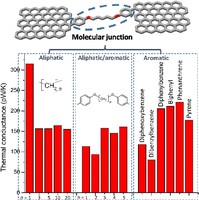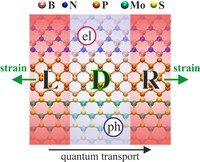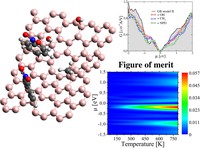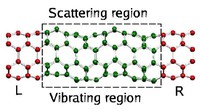former Dresden senior fellow
| Stay period: | Nov. 30, 2014 - Sept. 1, 2014 |
DRESDEN Senior Fellow 2014
September - November 2014
Since 2010, Dr. Alessandro Pecchia has been researching at the Institute of Nanostructured Materials (ISMN) at the Italian Consiglio Nazionale delle Ricerche (CNR) and also, since 2003, at the University of Rome Tor Vergata (Italy).
Dr. Pecchia’s two-month fellowship at the Chair of Materials Science and Nanotechnology, held by Prof. Cuniberti, was dedicated to the subject “Multi-Scale Simulations of Molecular and Nanoscale Electronic Devices”.
During his stay, Dr. Pecchia collaborated with Dresden researchers at numerous Institutes of TUD and at the cfaed Cluster of Excellence on current questions relating to molecular electronics, organic electronics, carbon-based nanoelectronics, bio-inspired nanoelectronics and sensor technology.
There were also close ties to non-university institutions, such as with the Leibniz Institute for Solid State and Materials Research Dresden, the Helmholtz-Zentrum Dresden Rossendorf, the Max Planck Institute of the Chemical Physics of Solids, and the Max Planck Institute for the Physics of Complex Systems. Moreover, he was closely involved in the activities of the Dresden Center for Computational Materials Science (DCCMS).
In several lectures, Dr. Pecchia presented the results of his research. These included a computer-based modelling tool by the name of TIBERCAD for the scale-independent simulation of semi-conductor components.
The goal of Dr. Pecchia’s stay was to further intensify the existing collaboration of TU Dresden with the CNR and the University of Rome Tor Vergata.
















former Dresden senior fellow
| Stay period: | Nov. 30, 2014 - Sept. 1, 2014 |
DRESDEN Senior Fellow 2014
September - November 2014
Since 2010, Dr. Alessandro Pecchia has been researching at the Institute of Nanostructured Materials (ISMN) at the Italian Consiglio Nazionale delle Ricerche (CNR) and also, since 2003, at the University of Rome Tor Vergata (Italy).
Dr. Pecchia’s two-month fellowship at the Chair of Materials Science and Nanotechnology, held by Prof. Cuniberti, was dedicated to the subject “Multi-Scale Simulations of Molecular and Nanoscale Electronic Devices”.
During his stay, Dr. Pecchia collaborated with Dresden researchers at numerous Institutes of TUD and at the cfaed Cluster of Excellence on current questions relating to molecular electronics, organic electronics, carbon-based nanoelectronics, bio-inspired nanoelectronics and sensor technology.
There were also close ties to non-university institutions, such as with the Leibniz Institute for Solid State and Materials Research Dresden, the Helmholtz-Zentrum Dresden Rossendorf, the Max Planck Institute of the Chemical Physics of Solids, and the Max Planck Institute for the Physics of Complex Systems. Moreover, he was closely involved in the activities of the Dresden Center for Computational Materials Science (DCCMS).
In several lectures, Dr. Pecchia presented the results of his research. These included a computer-based modelling tool by the name of TIBERCAD for the scale-independent simulation of semi-conductor components.
The goal of Dr. Pecchia’s stay was to further intensify the existing collaboration of TU Dresden with the CNR and the University of Rome Tor Vergata.















